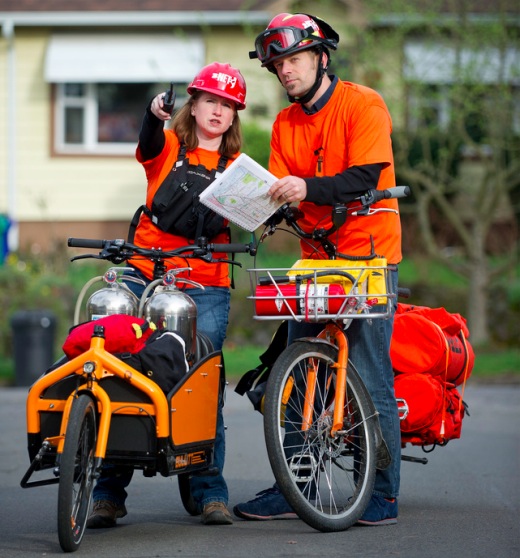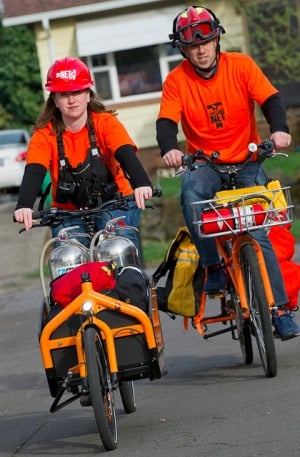
(Photos in this story were taken by Ethan Jewett for the new Neighborhood Emergency Team brochure.)
From the citizen-led Neighborhood Emergency Teams (NET), to an embrace of bikes as disaster response vehicles by City of Portland officials, there’s a growing effort in Portland to ensure that bikes play a key role in the response effort when a major earthquake or other disaster strikes. There’s even a cargo bike/disaster-themed Pedalpalooza ride in the works.
“We see cargo bikes… playing critical roles in the event our transportation system is compromised from a large scale earthquake.”
— Carmen Merlo, Director, City of Portland Bureau of Emergency Management
Why all the interest in connecting cargo bikes to disaster response? As The Portland Mercury pointed out in fantastic detail recently, after the Big One hits, “In the coming weeks, bikes will be the best way to get around.” Add in crazy global weather patterns and the threat of a tsunami (made much more real after what happened in Japan last year), and you can see the urgency. The rest of it is simply playing to Portland’s strengths. More people ride bikes in this town than any other big city in America and I’d bet we have the highest rate of cargo bike ownership in the nation.
Ethan Jewett is an active member of the Woodlawn NET. He’s one of the most prepared people I have ever met (the joke at our house is that when disaster strikes, we’re grabbing our roll cart of supplies and walking over to the Jewett house). He’s also a father (of one) and husband who sold a family car over three years ago and bought a bakfiets cargo bike (he now owns a Larry vs Harry Bullitt).
He’s been following the City of Portland Bureau of Emergency Management’s (PBEM) disaster plans closely. “In a disaster,” he told me on the phone yesterday, “a city’s resiliency is put to the test.” Jewett has read Portland’s official disaster plans and he says they include some “ominous tidbits.”
“They talk about the damage to the Interstate Highway and rail infrastructure, they talk about fuel rationing for critical services. That means there will not be fuel for everyone’s vehicles.” The way Jewett sees it, when fuel starts being rationed, Portland’s bikey-ness will shine.
“I look at Portland as having a unique opportunity in terms of preparedness. Without any planning at all, if something happened tomorrow, we’d be better off than many other cities because lots of Portlanders can get around without an automobile… If it takes 3-4 weeks to get adequate fuel supply, that wouldn’t even have an impact on my household.”
“Without any planning at all, if something happened tomorrow, we’d be better off than many other cities because lots of Portlanders can get around without an automobile.”
— Ethan Jewett, Woodlawn Neighborhood Emergency Team member
Jewett is taking his knowledge of preparedness and passion for cargo bikes straight to the City of Portland. Through the City’s NET program, Jewett has earned the ear of PBEM Director Carmen Merlo.
Reached yesterday, Merlo said her agency takes bike seriously.
“We see cargo bikes, as well as motorcycles and scooters, playing critical roles in the event our transportation system is compromised from a large scale earthquake. Whereas widespread damage or debris may make roads impassable for cars or emergency vehicles — bikes and motorcycles may still get around. We hope to tap into this network for assistance delivering food, fuel, tools, water, medical supplies, other emergency supplies, etc.”
(Merlo mentions motorcycles and scooters; but I’d point out that not only do they require fuel, they can’t carry as much and they are not as light, nimble, or efficient as bicycles.)
Merlo also said that bicycles will be specifically called out in the Portland Plan, a comprehensive planning document nearing adoption by City Council. In the neighborhood emergency response section of that plan, Merlo says, “We will focus on identifying locations of bicycle stores and repair shops to accommodate alternate transportation modes.”

Speaking of accomodating all transportation modes. TriMet is working on a new bridge over the Willamette River. When completed it will not only be Portland’s most seismically sound span, it is also being built with only bike, foot, and rail traffic in mind.
Beyond empowering citizens to remain mobile during a crisis, bikes will also play a direct role in the response. As a NET team member, Jewett was struck by how much gear and aid supplies they are responsible for. “We’re required to carry quite a bit of stuff on foot around our neighborhood. I’m keenly aware that a cargo bike is a much bigger platform, they can carry 3-4 times more stuff and I can leave it stationary without it on my back.”
As we’ve covered several times in the past, the appeal of cargo bikes goes way beyond utility. There’s a growing crop of local enthusiasts that simply love them. In a perfect mix of passion and pragmatism, a few Portlanders have come together to plan the Disaster Relief Trials — a cargo bike trial race that will happen in June during Pedalpalooza (stay tuned for more details).
Jewett stands in the middle of all these inter-related cargo bike currents: Helping organize the Pedalpalooza ride (which he was “stunned” to see organized completely independently of his own cargo bike efforts), bending the ear of the City, and pushing for bikes to play a larger role on his NET team.
“It’s a fascinating tableau,” he said, “If we had an earthquake right now, suddenly all the people in my neighborhood that have food gardens and cargo bikes would be pretty critical pieces of infrastructure.”
Our cargo bike revolution has rolled smack dab into the reality of a major disaster; and it makes the thought of how we’ll fare afterwards a tiny bit more bearable.

